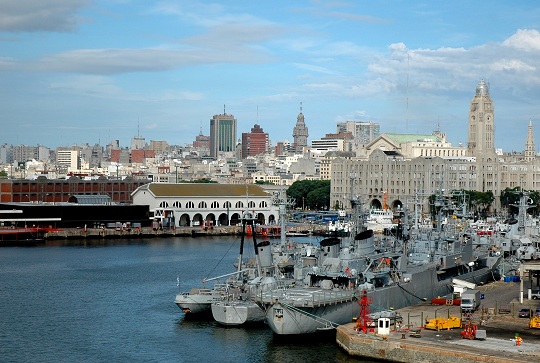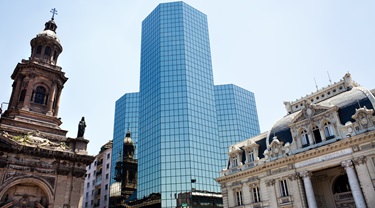
Why Uruguay is a reliable market for Canadian exporters
Author details
Jorge Rave
Regional Vice president – Latin America & the Caribbean
In this article:
Wedged between Argentina and Brazil, Uruguay is home to just 3.4 million people—comparable to a mid-sized North American city. Despite its modest scale, Uruguay is an overachiever in terms of political stability, transparency and economic consistency.
In a region often marked by political volatility, Uruguay’s steady governance and avoidance of radical policy shifts have fostered low corruption and reliable—if modest—economic growth. The country ranks 13th globally on the 2024 Corruption Perceptions Index by Transparency International, ahead of Canada (15th) and the United States (28th).
Uruguay’s predictable business climate makes it an ideal launchpad for accessing larger economies, like Argentina and Brazil.
“Uruguay is a trading nation with an educated and skilled labour force, and a gateway into the Southern Cone,” says Carmen Sorger, Canadian ambassador to Uruguay, of the geographical area that includes Brazil, Chile, Argentina, Paraguay and Uruguay.
“Uruguay stands out as a like-minded partner in Latin America, globally recognized for its deep commitment to democracy, transparency, human rights and the rule of law, in addition to its economic stability and strong macro-economic policies,” Sorger says.
Uruguay’s gross domestic product (GDP) is approximately US$80 billion and its proximity to major regional markets presents a rare opportunity for Canadian exporters.
Daniel Benatuil, senior economist and country risk analyst for Export Development Canada (EDC), likens Uruguay’s success to the meticulous care of Buckingham Palace’s lawns.
“There’s a very well-known analogy in Argentina about Uruguay. The grass at Buckingham Palace is so beautiful because that’s what happens when you nurture consistency—watering, trimming and repeating—year after year, over centuries. Uruguay nurtures things that are consistent with the rules of the game of what makes an economy tick,” he says.
Unlike its larger neighbours, Uruguay has avoided frequent policy swings, allowing it to focus on attracting investment and implementing sound economic policies, Benatuil says.
You should also check out
EDC interactive tool offers economic insights on Canada’s Top 75 trading partners.
While Canada and Uruguay don’t yet have a formal free trade agreement (FTA), both countries are working to modernize their longstanding Foreign Investment Promotion and Protection Agreement (FIPA), in place since 1999. Canada is also negotiating an FTA with Mercosur—the South American trade bloc that includes Uruguay, Argentina, Brazil, Paraguay and Bolivia—with a combined GDP of US$3 trillion.
Canadian exporters can benefit from Uruguay’s existing FTAs with Mercosur and Mexico, and potentially from the Mercosur-European Union agreement once it comes into force.
Uruguay’s 11 free trade zones (FTZ) also offer full tax exemptions—including corporate and import taxes—and allow 100% foreign ownership, making them attractive for Canadian businesses.
Why Uruguay is a smart bet for Canadian exporters in South America
Uruguay’s blend of political stability, skilled labour and open-market policies makes it a strategic choice for Canadian exporters and investors expanding into South America.
Despite its market size, Uruguay offers several advantages: A well-established democracy, a strong welfare state, an educated workforce and a major port in its capital, Montevideo.
“It’s a country where the rule of law is respected and there’s a good pool of skilled talent,” says Frederic Chagnon, spokesperson for Lallemand, a Canadian micro-organism and nutritional derivatives company.
“An educated workforce is readily available, the government is relatively stable with reasonable policies, and logistics from Montevideo are well-developed,” Chagnon says.

How does Montevideo support Canadian exporters?
Handling more than one million shipping containers annually, the Port of Montevideo is Uruguay’s primary gateway for international trade. Its modern infrastructure—including bonded warehouses and bulk cargo facilities—positions Uruguay as a regional logistics hub.
“Canadian companies have access to one door and then multiple avenues where they can sell their products,” says Fernanda Custodio, EDC’s senior regional manager for the Southern Cone.
“The business environment is exemplary. It’s a more amendable market, one where it’s easier to do business. By connecting with both Export Development Canada and the Trade Commissioner Service, companies can gain deeper insights and tailored support to navigate Uruguay’s opportunities with confidence.”
Custodio adds that Uruguay’s location supports trade diversification strategies focused on regional access rather than individual markets.
Uruguay’s investment grade economy: What Canadian businesses should know
Uruguay’s government is actively working to diversify trade and attract foreign direct investment (FDI). Its investment grade rating from all major agencies reinforces its reputation as a secure and predictable investment destination.
“Many Latin American countries want foreign investment, but weak governance often increases the cost of doing business,” says Benatuil. “Uruguay stands out by ensuring robust regulatory and institutional frameworks and maintaining a consistent policy stance.”
FDI inflows have remained resilient in recent years, with investments in agri-business, renewable energy, technology and logistics from global players, including corporations from the United States, Spain and Brazil. Canadian companies have also found opportunities in Uruguay’s growing information technology (IT) and forestry sectors.
“Uruguay is a small country, so it’s always looking abroad and, in that sense, it’s always open,” says Anaclara Acuña Puñales, a trade commissioner for the Trade Commissioner Service (TCS) in Montevideo.
Uruguay’s tech sector growth: Opportunities for Canadian ICT firms
Uruguay is a member of the Digital Nations (DN), a group of the world’s most digitally advanced countries, including Canada. Its digital-first strategy spans sectors—from livestock traceability to electronic medical records. Uruguay is actively engaging with international networks, like the Latin American and Caribbean e-Government Network (REDGEALC) and the Open Government Partnership.
Uruguay’s information and communication technologies (ICT) sector is one of its most dynamic and export-oriented industries. With strong government support, world-class connectivity and a thriving startup ecosystem, Uruguay is an ideal market for Canadian tech firms in software development, fintech, e-commerce and cybersecurity. Major players such as Google, Microsoft and Mercado Libre already operate in Uruguay.
Renewable energy and green hydrogen: Sustainability at scale
Uruguay has transformed its energy landscape, with more than 98% of its electricity now sourced from renewables—primarily wind, solar and hydro. The country’s rapid transition, from just 1% renewable energy in 2013 to 35% in 2018, is among the fastest globally.
“Small countries often lack natural energy resources—they’re not awash in crude oil or natural gas reserves. Being a net energy importer can be a big vulnerability in the external balance of payments. Uruguay made a deliberate effort to address that through renewables,” explains Benatuil.
Canadian companies can tap into opportunities in wind and solar power, biomass, energy storage, smart grid technologies and sustainable transportation, says Custodio.
“Uruguay is already a regional leader in renewables, which makes it a very significant place for Canadian export opportunities,” she says. “The country’s potential for green hydrogen production, supported by abundant renewable energy resources, offers opportunities for partnerships with government entities and private companies investing in green hydrogen projects.”
IT and digital transformation: A connected nation
Uruguay boasts around 95% fibre-optic coverage and has basic digital infrastructure that outpaces many regional peers. Demand for enterprise solutions, cybersecurity and cloud services is growing, creating opportunities for Canadian firms focused on fintech, e-commerce, artificial intelligence (AI), software as a service (SaaS) and computer hardware.
Canadian companies entering Uruguay’s IT market should consider partnering with local firms, especially in areas such as startups, education and skills training.
Infrastructure development: Building for the future
“An important competitiveness constraint for many Latin American countries is that the availability and quality of public infrastructure tends to be strong in and around the capital city, but is often deficient in more rural or remote areas, affecting connectivity,” says Benatuil. “Uruguay is no exception, despite its small geography.”
Infrastructure development—including transportation, energy, telecommunications and logistics—is a government priority. Major projects include new highways, railways and renewable energy facilities. Canadian exporters in construction and engineering with strong local representation can find opportunities in sustainable and environmentally friendly infrastructure.
Forestry: Sustainable timber and value-added exports
While neighbouring countries face deforestation challenges, Uruguay is committed to reforestation and aims to ensure deforestation-free wood exports, particularly to meet the European Union’s regulations. Export opportunities exist in engineered wood products, mass timber construction and forestry-related technologies.
With growing demand for certified wood, carbon-neutral building materials, biomass energy and advanced processing equipment, Canadian companies can tap into Uruguay’s expanding market for sustainable timber exports.
Agriculture and agri-tech: Innovation in the fields
Uruguay is a major exporter of beef, soybeans and dairy products and a significant consumer of Canadian potash. But there’s increasing interest in agri-tech and biotech to boost yields sustainably.
“The government is looking for opportunities to increase productivity without harming the environment,” says Acuña Puñales. “There’s some local research and investment from the government in an innovation agency, so there are opportunities there.”
She adds that Uruguay’s wine industry is one area where crop yield and productivity may offer opportunities for Canadian agri-tech experts. Canadian companies in agriculture can partner with local producers and exporters to access new markets. Investing in sustainable farming, organic agriculture and value-added food processing industries can yield strong returns.
Market entry challenges in Uruguay
According to EDC’s Country Risk Quarterly, Uruguay is considered a low-risk market with excellent ease of access and strong rating for ease of doing business. However, Canadian exporters should be aware of several challenges:
Understanding business culture
In Latin America, relationships are central to business success. Building strong local partnerships is essential, especially with those who understand government processes and regulatory frameworks.
“Sometimes, it’s not just understanding the local culture and how you do business here, but you also have to respond fast if you are bidding,” says Acuña Puñales. “Bids normally have a two- or three-week turnaround period, so you have to be ready.”
Navigating bureaucracy
Despite Uruguay’s digital advancements, many official processes still require physical documents, wet ink signatures and in-person notarization. Strong trade unions can also add complexity to business operations.
Limited specialty services
Manufacturers may face challenges with equipment repairs or modifications, as specialty services are often only available in neighbouring countries, like Brazil and Argentina.
How to enter the Uruguayan market successfully
Canadian exporters can improve their chances of success by investing in market research, cultural awareness and language skills.
Learn the local culture
Attending trade events, networking sessions and industry conferences can offer valuable insights into consumer preferences, market trends and competitive dynamics. EDC’s guide, Cultural tips for doing business in Latin America, is a helpful resource for best practices.
Adapt to market duality
Uruguay’s market features a strong multinational presence alongside a smaller domestic market. This duality requires a nuanced business approach. Canadian exporters can offer technology, machinery, or components that integrate into large-scale, export-driven production—especially in forestry, agri-business and pharmaceuticals.
For consumer-facing goods, products or services tailored to Uruguayan preferences—such as eco-friendly materials or Spanish-language digital tools—offer a competitive edge.
Export Development Canada (EDC) offers a range of services to help Canadian businesses succeed in Uruguay:
- Connect with local experts
- Arrange country visits
- Understand cultural norms and business etiquette
- Conduct due diligence on potential partners, including their environmental, social and governance (ESG) status and liabilities
- Navigate regulations and laws relevant to your exports or investments
You can also:
- Visit our Export Help Hub to explore growth opportunities.
- Explore country and economic info for Uruguay.
- Join the EDC Business Connections Program to connect with global companies.
- Partner with the Canadian Trade Commissioner Service for trade missions, sector insights and market intelligence.

















